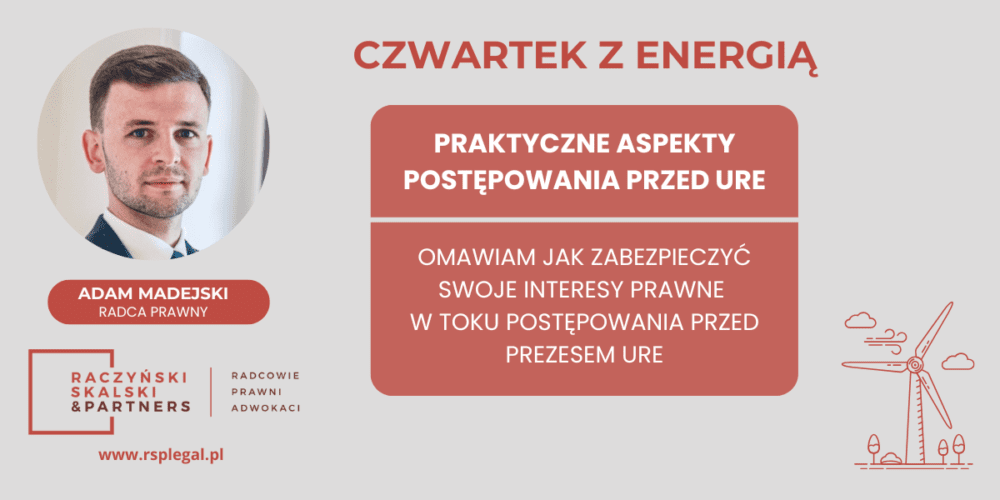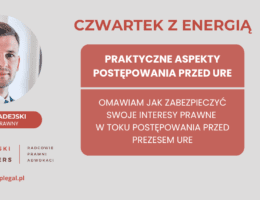In principle, proceedings before the President of the Energy Regulatory Authority resemble other “classic” administrative proceedings, namely:
-
-
- Proceedings may be initiated either upon application or ex officio,
- The basic principles of administrative procedure that bind the Energy Regulatory Office as a public administration body apply,
- Collection of exhaustive evidence is the responsibility of the Office, which, however, does not exclude an active attitude of the party regarding evidence,
- Decisions are issued in the form of administrative decisions, which may be appealed against.
-
However, it should be remembered that the legislator has provided for a number of features that make these proceedings distinctive In today’s post I will discuss the dissimilarities that should be taken into account when engaging in proceedings before the President of the Energy Regulatory Authority.
1. ERO’s broad inspection powers – Article 28 of the Energy Law
One of the most common threads in the context of proceedings before the ERO is calls for energy companies to provide access to their books of accounts and information about their operations. The key point here is that, according to established practice, the powers of the Energy Regulatory Office are very broad, and for this reason many entrepreneurs who encounter the ERO for the first time have doubts as to whether they should provide given information or documents to the authority. Of course, each time the scope of the summons and its legal basis should be carefully verified, while experience shows that it is worth applying the “all cards on the table” principle in such cases. The greater the transparency and willingness to cooperate on the part of the energy company, the more effective the proceedings will be.
Of particular importance, refusal to comply with the obligation to provide the ERO with documents or information, as well as misleading the authority, constitutes an administrative tort (Articles 56(1)(7) and (7a) of the Energy Law) and is punishable by a fine of no less than PLN 2,000. Practice shows that the ERO takes a restrictive approach to this obligation, and proving that the refusal to provide information was justified or the misrepresentation was not intentional places the burden on the party. In addition, as the Court of Competition and Consumer Protection ruled in Case XVII AmE 194/20: Submission of documents containing the requested information after the deadline and after the defendant has initiated administrative proceedings for the imposition of a fine cannot be considered proper fulfillment of the statutory obligation. This is because any failure to provide the information requested by the ERO President is a “refusal” to provide it.
2. Procedure for granting concessions
Any entity that intends to apply for a concession should adequately prepare for such a step. It is not only a matter of securing operational facilities to conduct regulated activities, but above all, the proper preparation of documentation, which can be very extensive and complex, covering both financial and technical issues.
First, it is necessary to determine in advance whether the application should be submitted to a field branch or the headquarters of the ERO. If time is of the essence, it will be a good idea to take care of such small details in advance.
Secondly, it will be necessary to complete such documents as a business plan, financial statements, cost analysis or projected income from regulated activities. It is worth using experienced industry advisors in this regard. Our law firm in this regard cooperates with experienced advisors who prepare business plans for licensed activities. Business plans for licensed activities prepared in this manner were accepted by the President of the ERO in the course of proceedings to obtain licenses for both electricity trading (OEE license) and gas fuel trading licenses (OPG license) including for trading in gas fuels with foreign countries (OGZ license).
Third, all documents drawn up in foreign languages or containing data in foreign languages (e.g., pictures of nameplates) must be submitted in a Polish language version prepared by a sworn translator. There are no exceptions to this rule.
Fourth, if deficiencies need to be corrected, the summons from the Energy Regulatory Office will be sent only once. This should be borne in mind already at the stage of planning the submission of the application, as it happens that the “sending” of missing documentation may be delayed for various reasons, with further processing of the application at stake. As a rule, the deadline indicated by the ERO for completion is 30 days, which in some cases may be too short.
Fifth, depending on the subject matter of the activity for which the license is to be granted, it may be necessary not only to demonstrate possession of adequate financial resources, but also to provide a cash collateral. This is particularly true for new entrants, applicants operating in groups through special purpose vehicles, or applicants without experience in this type of business.
3. Non-obvious appeals
What definitely distinguishes the proceedings before the ERO President from classic administrative proceedings is the judicial review of issued decisions. Pursuant to 479(46) of the Code of Civil Procedure, appeals against decisions of the ERO President are heard by a common court – the Court of Competition and Consumer Protection, acting as the XVII Division in the District Court in Warsaw.
Filing an appeal means entering into a dispute in which the ERO President is a party, not a public administration body, and the proceedings are based on civil procedure. This means that not only the incumbent party, but also the ERO President is obliged to apply such procedural rules as evidentiary initiative and burden of proof. In the context of evidentiary proceedings, it is worth remembering that the appealing party has the right to invoke new facts and evidence, but as a rule, the recommended action is to disclose all the evidence and information it has already at the stage of administrative proceedings.
4. The president of the ERO is a public administration body
There is a rather non-obvious consequence associated with the above statement in the context of proceedings before the ERO President, namely that such proceedings should proceed using all the rules of administrative procedure described in the Code of Administrative Procedure, unless special provisions provide otherwise. This includes, among other things, the issue of the speed of the proceedings, the rules for gathering and evaluating evidence, the principle of objective truth or resolving doubts of interpretation in favor of a party. Equally important is the principle of the rule of law, according to which, in the shortest terms, state bodies act on the basis and within the limits of the law.
Using the resulting arguments can improve a party’s litigation position and even tip the scales in its favor. In particular, attention to formal details and the establishment of all the relevant circumstances of the case can be key to obtaining a favorable outcome, for example, by establishing that there was no effective service of the plan to introduce restrictions on electricity consumption (for example, the decision of the Supreme Court in the case I NSK 90/22).



